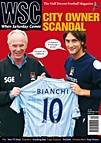 Thaksin Shinawatra buys Man City Ian Farrell reports
Thaksin Shinawatra buys Man City Ian Farrell reports
Upon taking control of Manchester City, billionaire businessman and ex-Prime Minister of Thailand Thaksin Shinawatra, clearly having been made aware that nothing wins the British over like a self-deprecating sense of humour, said that he didn’t mind that people had trouble pronouncing his surname and was happy to be referred to as “Sinatra”. It remains to be seen whether it will enjoy the same popularity as the nickname he’s commonly known by in his own country: Ai Na Liam, or Mr Square Face. This might seem harmless enough, but it wasn’t coined purely to poke fun at his rather Cubist features. There’s also a secondary sting that should worry all City fans: the Thai word for square-shaped also means “con man”.
The military government that peaceably ousted Shinawatra in September 2006 has accused him of, among other things, major corruption, selling off national assets for personal gain, curtailing the freedom of the press and using the cover of a war on drugs to suppress elements of the population. This isn’t quite like hearing that your club has been bought by a consortium of Serb ethnic cleansers fronted by Jonathan King, but the openly made charges still dwarf the urban myths and innuendo that follow the Premier League’s other foreign tycoons. And yet, no one has taken to the streets in protest.
In fact, nothing much has been done to stop Shinawatra. The takeover was almost a fait accompli anyway, as he’d quietly entered into an Irrevocable Undertaking Agreement with John Wardle, David Makin, Francis Lee, Dennis Tueart and several other major shareholders happy to do business (essentially a promise to sell him their stakes for an agreed price). This meant that by the time news of the planned buyout became public he effectively owned 55.94 per cent of the club already. Another bloodless coup, and one that the Premier League’s “fit and proper person” test looks powerless to derail.
Not that the fans seem to want it derailing. There have been some complaints on the forums and phone-ins, often about Thailand’s human-rights record, but those with an active dislike of the new regime are in a depressing minority. Most are actually quite excited after so many barren years. But just who’s bankrolling that future should matter. Nothing has been proven, but either to ignore a man’s background or simply to dismiss the allegations as politically motivated is worryingly blinkered.
Given City’s traditional image as a community club, happily welcoming a foreign billionaire might seem an unlikely way to go. But things have been slowly changing at City over recent years and they’ve moved far away, literally and figuratively, from the red brick streets of south Manchester – that switch to the new, corporate world of the Eastlands complex didn’t meet with much resistance either.
Despite what the Daily Mail might think of his abilities, landing someone with Sven-Göran Eriksson’s track record was a major achievement and a serious statement of intent. Eriksson, the supporters and Shinawatra might all have different motivations for their union – to restore a reputation, to finally win a trophy in the post-Elvis era, to earn money while becoming sufficiently high-profile in the West as to be virtually untouchable – but all are pushing for success. It’s true that the squad revolution has begun quietly – Rolando Bianchi, Gelson Fernandes and Geovanni are all names that the fans would have had to Google – but there are clearly big plans for the “brand”.
The question is, what exactly does he mean by the dreaded “b” word? City are traditionally a more parochial club, an unpretentious side for those in Manchester and the surrounding towns uncomfortable with United’s international appeal. By definition, it’s hardly something you can hang a global marketing campaign on. Of course, what Shinawatra has paid out for isn’t really a brand; he’s simply bought himself a seat at the most lucrative table in sport, the Premier League. Liverpool wouldn’t sell in 2004, City did in 2007, and if they hadn’t he would probably be buying Birmingham as we speak.
Purely from a football point of view, these are exciting times. But even the most optimistic fans will have to accept that such a strange clash of cultures has the potential for disaster. The new owner may have been on a charm offensive, but given his attitude to dissent it will be interesting to see what happens if things don’t go right. City’s tumultuous, tragicomic history might just be the trailer for the real drama to come.
From WSC 247 September 2007